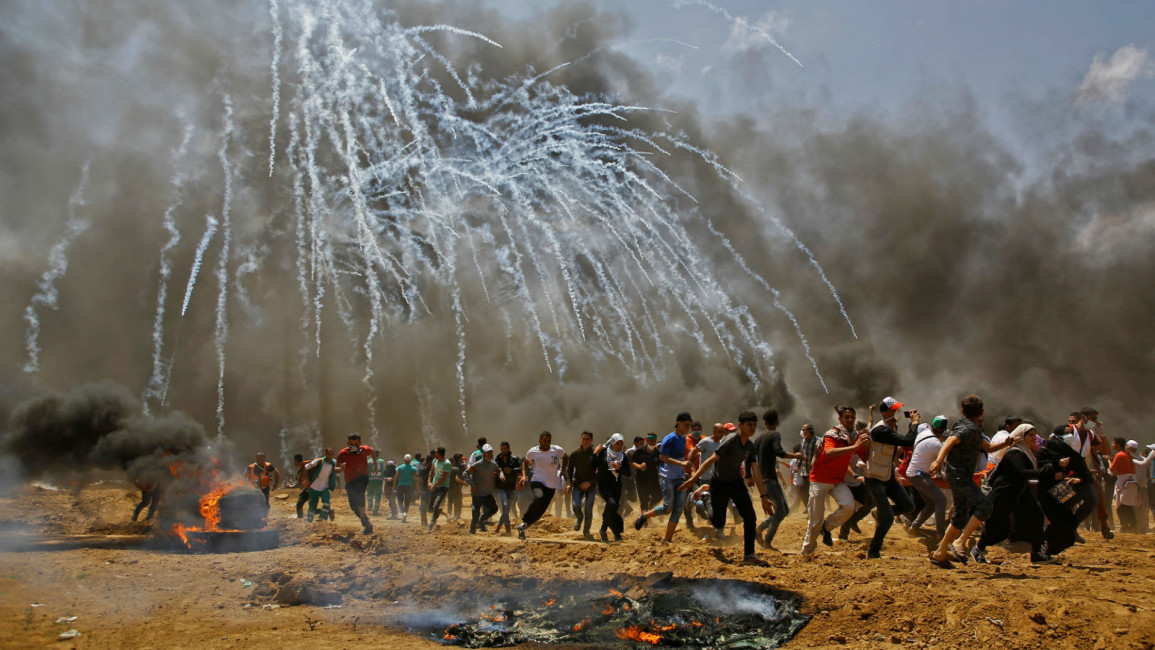'A year of shame': Global indifference drives Middle East rights abuses in 2018
Global indifference is fuelling atrocities across the Middle East, rights watchdog Amnesty International warned on Tuesday in a report condemning what it called growing impunity.
"The crackdown on civil society actors and political opponents increased significantly in Egypt, Iran and Saudi Arabia," the rights watchdog said in its annual regional report.
"Is it acceptable for activists to undergo arbitrary detention, torture, sexual harassment ... and even enforced disappearances simply for expressing their opinions in a peaceful way," Amnesty's regional director for the Middle East and North Africa, Heba Morayef told a press conference in Beirut on Tuesday.
The annual report said "global indifference to human rights violations" had fuelled "atrocities and impunity" in the region in 2018.
Western arms sales
Amnesty cited the killing of Saudi journalist Jamal Khashoggi in the kingdom's consulate in Istanbul On October 2, saying the "case has not been followed by concrete action to ensure those responsible for his murder are brought to justice".
 |
Allies of governments in the region have always placed lucrative trade agreements, security cooperation, or multi-billion dollar arms sales ahead of human rights - Rasha Mohamed, Yemen researcher at Amnesty |
 |
It applauded "rare action" from countries like Denmark or Germany which suspended arms supplies to Riyadh, but noted that key allies of the kingdom, including the USA, UK and France, have taken no such action.
Arms exports to Riyadh have enabled the kingdom to target "civilians, schools and hospitals" in Yemen, Amnesty said, with the Saudi-led coalition "responsible for war crimes" and enabling a "humanitarian catastrophe" in the country.
"It took Jamal Khashoggi's cold-blooded murder inside a consulate to prompt a handful of more responsible states to suspend arms transfers to a country that has been leading a coalition responsible for war crimes and has helped create a humanitarian catastrophe in Yemen," Morayef said.
"Yet even the global outcry over the Khashoggi case has not been followed by concrete action to ensure those responsible for his murder are brought to justice."
Twitter Post
|
Amnesty also highlighted Israel's crackdown on demonstrations in Gaza and the occupied West Bank, which it says killed at least "195 Palestinians, including 41 children".
The US has committed to providing Israel with $38 billion in military aid over the next ten years, despite the fact that Israel's military enjoys complete impunity.
"Time and again allies of governments in the region have put lucrative business deals, security co-operation or billions of dollars' worth of arms sales fuelling abuses and creating a climate where MENA governments feel 'untouchable' and above the law," Philip Luther, Research and Advocacy Director for the Middle East and North Africa at Amnesty International, said.
Crackdown on dissent
The "intense crackdown on dissident voices" in a number of Arab countries is linked to the 2011 Arab uprisings, said Morayef.
"Authoritarian governments today are trying to make very, very sure that there is no political space to ever allow such an uprising to occur again", she said.
In Iran, security forces "violently dispersed the protests, beating unarmed protesters and using live ammunition, tear gas and water cannons against them", causing deaths and injuries, according to the report.
More than 7,000 protesters, students, journalists and human rights workers were detained in 2018 by Iranian forces.
 |
The vacuum of accountability throughout the region has meant that authorities in MENA have had free rein to imprison peaceful critics, restrict the activities of civil society or use arbitrary arrest, detention and excessive use of force against protesters demanding their rights |  |
In Saudi Arabia, authorities lifted a driving ban on women "even as they imprisoned women human rights defenders who had campaigned for this very right," Amnesty said.
Authorities arrested and prosecuted government critics, academics and activists, with "virtually all human rights defenders in Saudi Arabia" now behind bars or forced to flee the country.
Egyptian authorities intensified a crackdown on dissent in the run-up to presidential elections, detaining at least 113 people for expressing critical opinions and enacting new laws to silence independent media.
In the United Arab Emirates (UAE) and Bahrain prominent activists Ahmed Mansoor and Nabeel Rajab were punished with heavy prison terms of 10 and five years respectively for their social media posts.
War crimes
The Amnesty report also denounced "war crimes" committed in Syria, Libya and Yemen, which have been ravaged by deadly conflicts and humanitarian catastrophes.
In the three countries, "military forces with air power carried out indiscriminate air strikes and direct attacks on civilian homes, hospitals and medical facilities, sometimes using internationally banned cluster munitions," Amnesty said.
"Allies of governments in the region have always placed lucrative trade agreements, security cooperation, or multi-billion dollar arms sales ahead of human rights," Yemen researcher at Amnesty, Rasha Mohamed told the press conference.
The rights group pointed however to some positive developments in the region which it said serve as "glimmers of hope".
Across the Maghreb, provisions to combat violence against women have come into effect.
Agencies contributed to this report.



